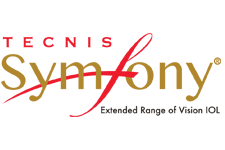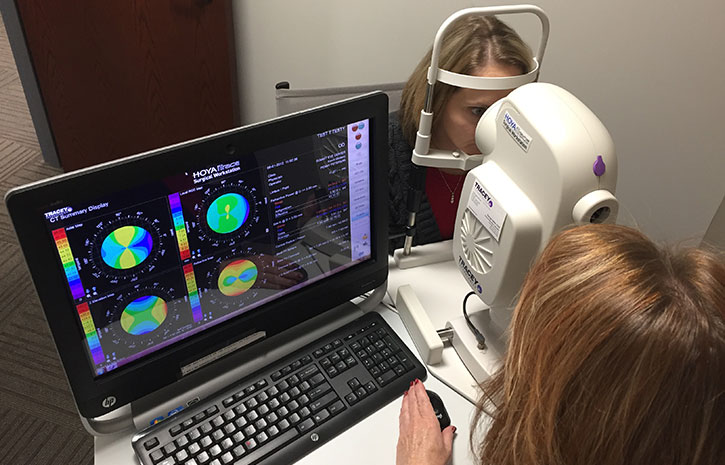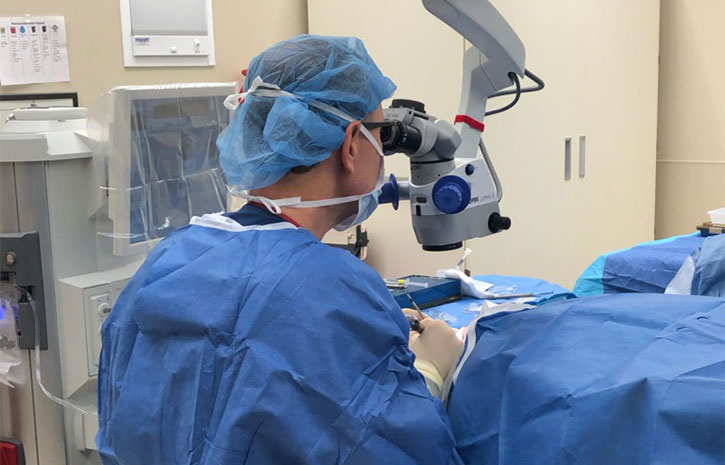Cataract Surgery and Lens Implant Options in Lee's Summit
-
What is a Cataract?
A cataract changes the transparency of the lens inside the eye. The lens becomes yellow and clouded instead of clear. In a healthy eye, the light focuses clearly on the retina. A cataract scatters the light, impairing vision. Cataracts cause blurred vision, halos, glare, difficulty reading or driving in dim light. They commonly occur with age and can be monitored until they interfere with daily life.
Once a cataract forms and impairs your vision, the only solution is to surgically remove it.
-
What are Symptoms of a Cataract?
If your vision has been gradually declining, you may have a cataract. An ophthalmologist or optometrist will perform a dilated eye exam to determine if you have a cataract. Cataracts cause the following symptoms:
- Blurry vision
- Fading colors
- Difficulty reading
- Problems driving at night
- Glare or halos around lights
Eye Surgical Treatment Options for Cataracts
There are no other effective treatments for a cataract other than surgical removal. The cataract eye surgery typically takes less than 15 minutes. It is performed under topical anesthesia requiring no stitches. During the eye surgery, the natural lens is replaced with an artificial implant. The material constituting the implant has been proven completely safe and effective.
-
Is Cataract Eye Surgery Safe?
Summit Eye Center employs advanced methods to ensure the best and safest cataract eye surgery experience for our patients. For the best results, consider premium lens implants. They reduce dependence on glasses after surgery, maximizing your benefit.
Cataract Surgery Education
Receive educational information regarding what to expect and how to prepare for your upcoming cataract surgery.
Premium Lens Implants for Vision Correction Solutions
If you’re approaching the age for cataract surgery and blurry vision is impairing your daily life, lens implants might be a good fit for you. They’re made of either acrylic or silicone and will typically last you for the rest of your life. Your surgeon will recommend the lens implant option best for you.
There are two categories of lens implants: Standard Lens and Premium Lens.

-
Standard Lens Implants
Standard Lens Implants are typically best for distance vision and corrects for only one range of vision, either distance, where you’ll need reading glasses for close vision, or near, where you will need glasses for activities like driving. Standard lens implants are an excellent choice for patients who don’t mind wearing glasses for some activities.
-
Premium Lens Implants
Premium Lens Implants are typically best for both near and farsightedness and contribute a continuous range of vision. The advantage to premium lens implants is your functional vision spans distance to close-up without glasses (which you would need to wear with standard lens implants).
Premium bifocal lens implants are a new and exciting advancement in refractive cataract surgery. They enhance both distant and near activities with both eyes, which creates fantastic binocular vision. Since the mid-1990s, millions of satisfied patients have enjoyed this FDA approved technology. Although corrective eyewear may occasionally be necessary, the freedom from glasses and contact lenses remains incredible.
Our Premium Lens Implants Help Repair Your Vision for the Following Focal Points:
Near Vision
Near Vision pertains to focal points which are typically 16 inches or closer to your eyes. Another name for near vision is “reading vision.”Intermediate Distance
Intermediate Distance refers to activities performed at arm’s length, such as your computer, music, and the dashboard of your car.Distance Vision
Distance Vision is attributed to focal points 3 feet or more from your eyes, such as billboards, street signs, and movie screens.Many who receive a premium lens will experience significant vision improvement after surgery.
However, not everyone will see 20/20 at all distances. In some situations, glasses will help. Patients with the premium lens implants may notice some glare and halos immediately after surgery. This will diminish as your eyes and brain learn to adapt to the new lens. Preoperative measurements are taken to the hundredth of a millimeter to help ensure the best possible vision after surgery. However, the final visual outcomes can be affected by your healing process. If you experience serious effects such as nearsightedness, astigmatism, or farsightedness, you may need an additional procedure like PRK to recover properly. -
Insurance Coverage for Cataract Surgery
Your insurance will typically cover the cost of cataract surgery, anesthesia, and standard lens implants.
The premium lens implants are not covered by Medicare, Medicaid, and other health insurance. An out-of-pocket expense will cover the cost of the premium lens. There may be an added cost if an additional procedure is required to optimize your vision. Summit Eye Center offers low payment plans including 0% interest options.
Contact the eye doctors at Summit Eye Center to see if you qualify for this fantastic opportunity to achieve a fresh view of the world! By assessing your individual eye health and lifestyle preferences, the doctors at Summit Eye Center can determine which lens will help you achieve your vision goals.
Available Premium Lens Implants
Below are the premium lens implants that Summit Eye Center is proud to offer:
-
Light Adjustable Lens
 The Light Adjustable Lens is made of a special material that allows the customization of the lens power after cataract surgery to allow the optimization of one’s vision for their unique goals.
The Light Adjustable Lens is made of a special material that allows the customization of the lens power after cataract surgery to allow the optimization of one’s vision for their unique goals. -
TECNIS Synergy
 The TECNIS Synergy lens creates an expanded depth of focus to broaden the range of vision from distance tasks (driving a car), intermediate tasks (working on a computer), and near tasks (reading a book).
The TECNIS Synergy lens creates an expanded depth of focus to broaden the range of vision from distance tasks (driving a car), intermediate tasks (working on a computer), and near tasks (reading a book). -
TECNIS Symfony
 The TECNIS Symfony lens creates an expanded depth of focus to broaden the range of vision from distance tasks (driving a car) to intermediate tasks (working on a computer).
The TECNIS Symfony lens creates an expanded depth of focus to broaden the range of vision from distance tasks (driving a car) to intermediate tasks (working on a computer).
Content reviewed by Kelsey J. Kleinsasser, O.D.


